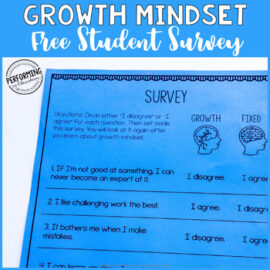What is Growth Mindset?
Having a growth mindset means you believe that you can get smarter through hard work and practice. Growth mindset isn’t just important for your students that struggle; it’s also important for your students that exceed. For the students that exceed, growth mindset teaches them that their intellectual ability can always be further developed.
If you have any of the following students in your classroom, it might be time to teach about growth mindset:
- Students that “know” they’re bad at school
- Students that get good grades without really trying
- Students that quit when assignments are hard
- Students that don’t see the point in doing classwork or homework
- Students that don’t want to receive help or tutoring
- Students that never raise their hands
|
Fixed Mindset |
Growth Mindset |
| “I’m bad at math.” | “I need more practice and help to succeed.” |
| “I can’t do it.” | “I can’t do it yet, but I’m working on it.” |
| “Derek always gets a 100%. Must be nice.” | “I wonder what I could learn from Derek.” |
| “My work is fine the way it is.” | “I want feedback, so I can make my work better.” |
| “My friends should all agree with me.” | “It takes effort and working through differences to stay friends.” |
| “I’m the best at this.” | “I’m on the right track. I wonder what I can do to get even better.” |

What is the connection to Project-Based Learning?
If you’ve read my blog before, you know that project-based learning has been my method of choice for delivering my lessons for years. Now that I work directly with teachers to develop authentic project-based learning activities, I see the common struggles that students have.
Some of the most common struggles I see from teachers implementing project-based learning are related to growth mindset.
Common Mindset Struggles:
- My students rush to get their work done and don’t really ask any questions that lead to in-depth inquiry.
- My students act completely helpless. They want me to tell them exactly what to do.
- My students let other students in their group do all the work because they’re “the smart kids”.
The fact that students experience these issues during project-based learning makes it a great way to teach growth mindset. It’s not easy to teach growth mindset when you’re having students do worksheets, but it is easy to teach them when they’re working on a long term project where they have to problem solve and collaborate!
How do you encourage Growth Mindset Within Project-Based Learning?
First of all, identify the attitudes of your individual students. A great way to do this is by giving them a short growth mindset survey. You can download the survey I use by clicking the image below. The thing I love most about this survey is that we don’t need a scoring sheet. They can see if their answer fits in the “growth” or “fixed” category immediately. They can also see which column most of their answers fall into, and what areas they need to work on. Use these results to help students set personal goals that they will work on throughout their project-based learning activities.
Project-based learning is an authentic way to teach students what growth mindset actually looks like. I promote growth mindset in PBL using the following strategies:
- Encouraging students to ask questions and complete research to become experts at topics they’re not sure about (in-depth inquiry)
- Teaching students that their work can always be improved upon (critique & revision)
- Giving students a purpose for their learning (driving question)
- Recognizing students that ask questions and complete extended inquiry outside of class time
- Practicing perseverance and 21st century competencies

If you’d like to learn more about how to plan and implement project-based learning, check out this blog post series!




